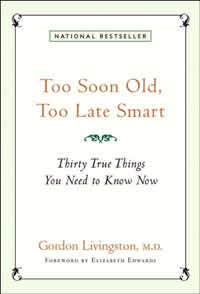Book Notes
 Gordon Livingston, M.D., Too Soon Old, Too Late Smart – Thirty True Things You Need to Know Now (New York: Marlowe & Company, 2004), 168 pages.
Gordon Livingston, M.D., Too Soon Old, Too Late Smart – Thirty True Things You Need to Know Now (New York: Marlowe & Company, 2004), 168 pages.
A guest review by Richard C. Worden, RSW, CFLE, D.Min. Worden is a retired minister and Family Social Worker now in private practice. He lives in Medicine Hat, Alberta, Canada.
Consider the story about “The Three Puzzle Rooms of Life.” Once upon a time, life was like entering puzzle room number one. As you entered the room, a person was given the pieces to the puzzle of life and a picture to follow. Life came together by imitating the model. Later, life became like entering puzzle room number two. Once again, a person was given the pieces of the puzzle of life, but this time no picture to follow. Trial and error were used to put life together. Today, life is like puzzle room number three. The pieces of the puzzle of life are offered, no model is available, and when a person manages to get two or three pieces of the puzzle to fit, suddenly the puzzle changes shape.
Through his involvement in the Vietnam War and its consequences, Gordon Livingston describes passionately and sincerely “the third puzzle room of life.” He does so from the perspective of a psychiatrist and a psychotherapist. He is also well acquainted with grief, managing to live through the pain of divorce and the death of two sons.
Livingston brings to the work of psychotherapy and pastoral care an important approach which tends to be overshadowed by popular methods, whether Biblical or Pop-Psychological. He writes, “Therapy, properly done, is a combination of confessional, re-parenting, and mentoring.”
Life is about change, and change can be for the better or the worse. Livingston strongly reminds us that change is a choice. The choice is often impeded by medication and systems which can perpetuate dependency.
Livingston’s thirty short articles address the nature of the human personality, habits, death, adoption, perfectionism, depression, suicide, forgiveness, happiness, parenting, divorce, and marriage. He encourages caregivers to be listeners looking for the connections in what is heard, to hear the hidden fears, and to promote hope. What makes psychotherapy work for Livingston is love, which is willingly shared. He states, “We are never out of choices, no matter how desperate the circumstances.”
While expressing a nonjudgmental approach, Livingston does not profess any neat and tidy faith. He is taking a “time out” from religion. He is in the third puzzle room of life as he attempts to come to terms with his own personal losses. However, he does offer caregivers this insight. While flying an airplane, Livingston discovered that his map and the features on the ground did not agree. He was informed by an officer, “if the map does not agree with the ground, then the map is wrong.” Livingston confesses, “I have learned that our passage through life consists of an effort to get the map in our heads to conform to the ground on which we walk.”
The book's Foreword is written by Elizabeth Edwards, a grieving parent and a cancer patient. Livingston expresses the end of grieving succinctly: “Coming to terms with our past is inevitably a process of forgiveness, of letting go, the simplest and most difficult of all human endeavors. . . . until the moment you do it.”


